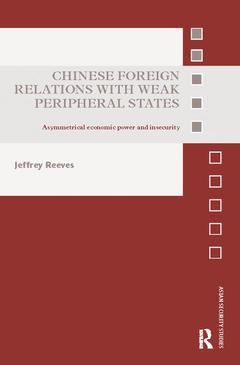Chinese Foreign Relations with Weak Peripheral States Asymmetrical Economic Power and Insecurity Asian Security Studies Series
Auteur : Reeves Jeffrey

This book examines China?s relations with its weak peripheral states through the theoretical lens of structural power and structural violence.
China?s foreign policy concepts toward its weak neighbouring states, such as the ?One Belt, One Road? strategy, are premised on the assumption that economic exchange and a commitment to common development are the most effective means of ensuring stability on its borders. This book, however, argues that China?s overreliance on economic exchange as the basis for its bilateral relations contains inherently self-defeating qualities that have contributed and can further contribute to instability and insecurity within China?s periphery. Unequal economic exchange between China and its weak neighbours results in Chinese influence over the state?s domestic institutions, what this book refers to as ?structural power?. Chinese structural power, in turn, can undermine the state?s development, contribute to social unrest, and exacerbate existing state/society tensions?what this book refers to as ?structural violence?. For China, such outcomes lead to instability within its peripheral environment and raise its vulnerability to security threats stemming from nationalism, separatism, terrorism, transnational organised crime, and drug trafficking, among others. This book explores the causality between China?s economically-reliant foreign policy and insecurity in its weak peripheral states and considers the implications for China?s security environment and foreign policy.
This book will be of much interest to students of Chinese politics, Asian security studies, international political economy and IR in general.
Introduction 1. Asymmetrical Economic Exchange: Negative Outcomes of Structural Power and Structural Violence 2. China’s Relience on Economic Exchange with its Perihperal States 3. Sino-Kyrgyz Relations 4. Sino-Kyrgyz Relations 5. Sino-Afghanistan Relations 6. Sino-Pakistan Relations 7. Sino-Nepal Relations 8. Sino-Myanmar Relations 9. Sino-Lao PDR Relations 10. Sino-Mongolia Relations 11. Weak States, China’s Security, and Policy Prescriptions 12. Weak States, Structural Power, and Structural Violence
Jeffrey Reeves is Associate Professor at the Asia-Pacific Center for Security Studies, Honolulu, Hawaii, USA, and has a PhD in International Relations from the London School of Economics and Political Science. He is co-author of Non-traditional Security in East Asia: A Regime Approach (2015, with Ramon Pacheco-Pardo).
Date de parution : 06-2017
15.6x23.4 cm
Date de parution : 10-2015
15.6x23.4 cm
Thèmes de Chinese Foreign Relations with Weak Peripheral States :
Mots-clés :
Lao People's Democratic Republic; China; Gorno Badakhshan Autonomous Province; peripheral states; Chinese Structural Power; weak states; Chinese FDI; China’s Structural Power; Gdp Growth; Country’s Natural Resource Sector; Silk Road Economic Belt; Country’s Mining Sector; China’s Bilateral Relations; Chinese Government; Sino Myanmar Relations; China’s Foreign Policy Approach; Negative Structural Power; Lao PDR; Nontraditional Security; Shwe Gas Pipeline; Fast Gdp Growth; Negative Gdp Growth; Military Junta; China’s Commercial Activities; LPRP; Mongolia’s Production; Land Reclamation; ISAF’s Withdrawal



